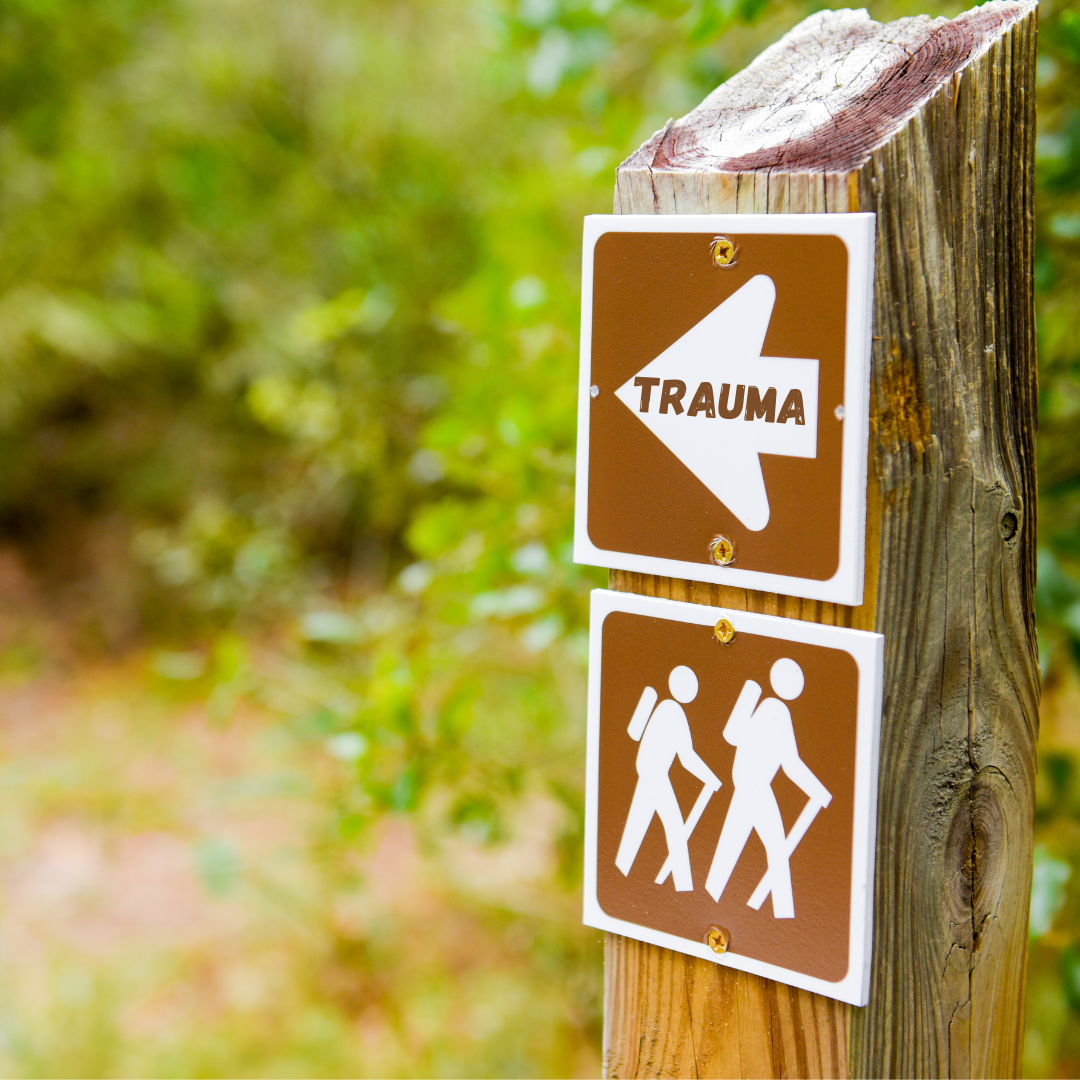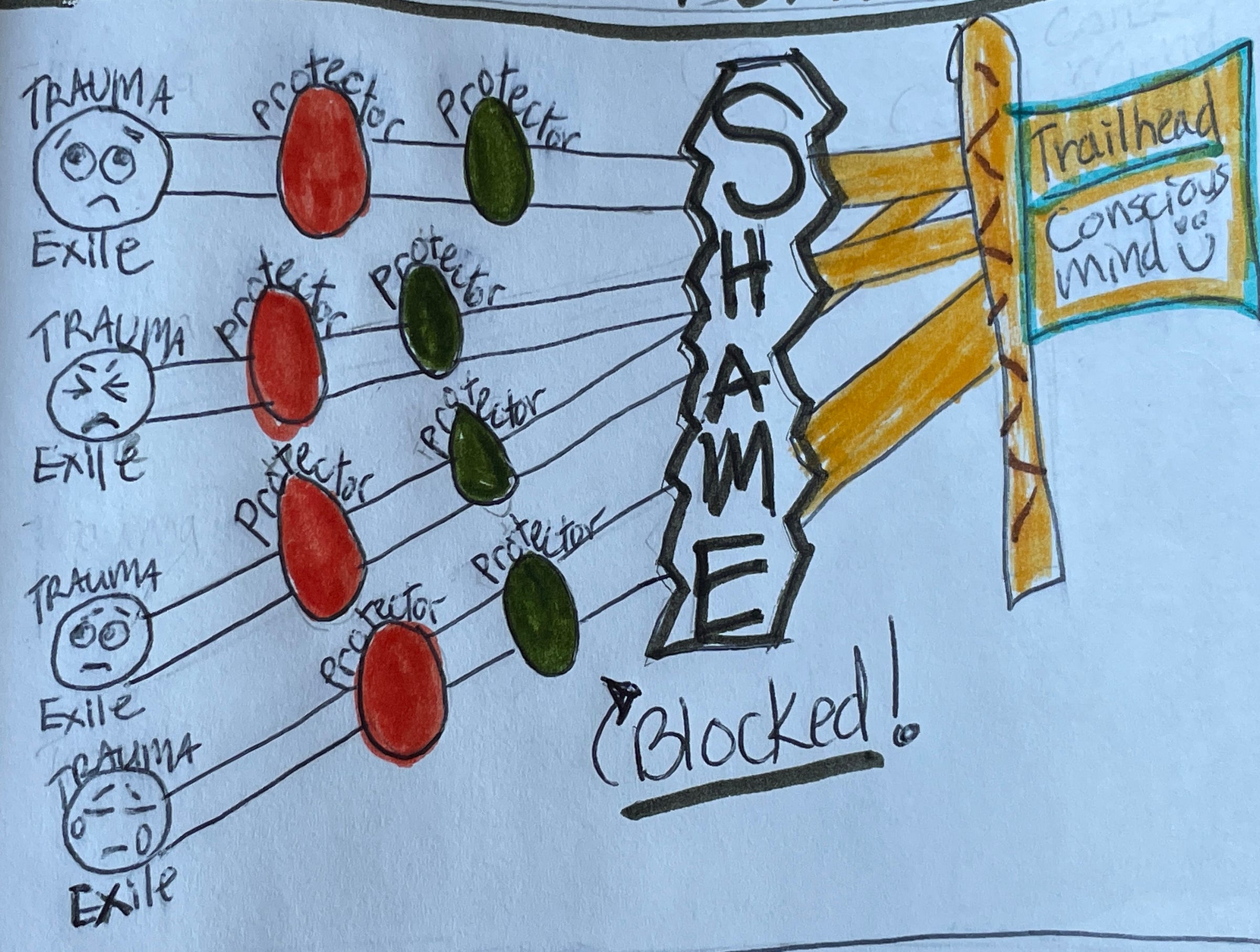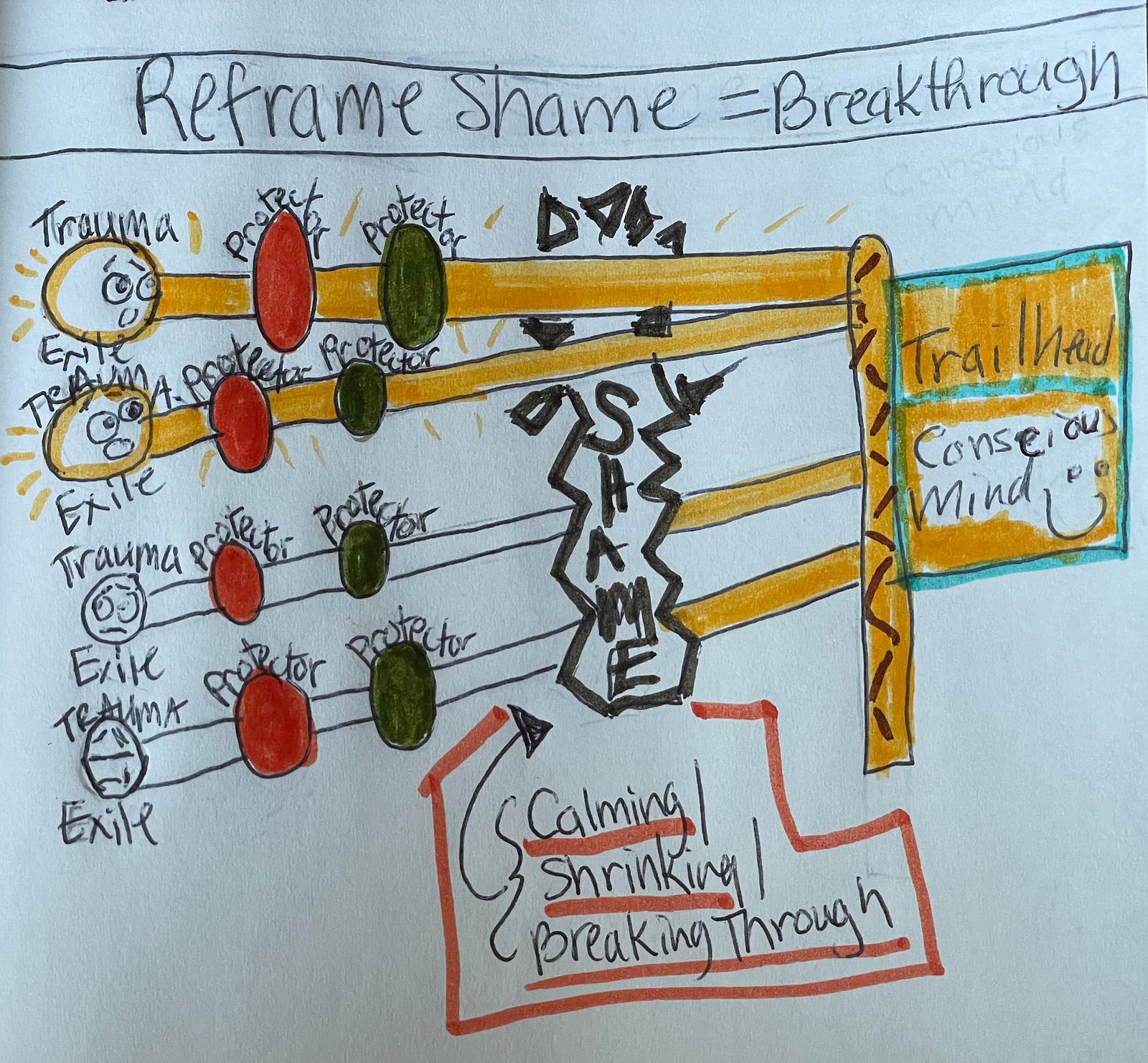
Created in Canva by Jamie Donmoyer
Perched on a stone wall between Starbucks and a fancy purse boutique, I peer over my phone. The Hollywood Tower of Terror glows in the distance as determined parents push strollers filled with exhausted toddlers, bubble machines, and sippy cups. They can’t leave without riding “Mickey’s Runaway Railway!”
Buzz! Not the character, it’s my phone. Is my family done riding Rock ‘n Roller Coaster? Nope! It’s my email.
“Thank you for applying. Although your skills are impressive-“ No need to read on. This is the 10th rejection I’ve gotten in the past few months. I remind myself that it didn’t pay what I needed, that I was overqualified, and that I didn’t even want the job, but it’s too late. The buildings around me are already melting, my ears ring, and a cold, icy fear shoots through my body, tightening every muscle. You’re worthless, you’ve failed. Instant dissociation.

Made in Canva by Jamie Donmoyer
This extreme reaction to something that’s seemingly benign is brought to me by Complex PTSD. Externally, nothing happened. I glanced at my phone and looked away. Internally, I’m terrified, lost in an emotional flashback.
When a soldier responds to fireworks as if it’s gunfire, that makes sense to people, but an email rejection for a job you don’t even want, what’s the big deal?
How I wish I knew the answer. I’d love to brush it off. My nervous system just won’t let me. In the meantime, I fight to stay present as my head fills with static. Voices swirl in a tornado of criticism. Teachers, bosses, friends, and my parents.
My father’s covert narcissistic abuse created a family cult. He was the hero or victim and I was his scapegoat, labeled as a dramatic, attention-seeking liar. It was an upside-down world where emotions were dangerous. You never knew when the rage, silent treatment, or targeted attack would occur. I had a village of people telling me he was right and I was wrong.
Now, I clench my phone and shake as shame takes over. Snap out of it! You’re in “the most magical place on Earth.” Be happy! I’m on autopilot. Shaming my shame only makes things worse. What if my husband sees me like this? He always reminds me not to put all my eggs in one basket. Did I do that with this job? I must have! HIDE! HIDE! HIDE!
Anyone who knows my husband knows that he’s the last person anyone needs to hide from. He’s patient, kind, and understanding, but I’m scared of everyone and everything when I’m in a trauma response. My therapist says the rational part of my brain (prefrontal cortex) goes offline. It’s underdeveloped from years of child abuse. Brain scans of children who experience prolonged child abuse match those of children who grew up in war zones. Our fight-or-flight survival instinct is permanently switched on.
Now I’m in “fix-it” mode. I do my go-to helpful things. I text my sister, deep breathe, and write it out, but the panic is here to stay. How ironic that I didn’t ride the roller coaster because I’m working to un-adrenalize my nervous system, and now just because I read a few words, my ears are numb and have a heartbeat.
Awkwardly, I rejoin my family trying not to explode. Alternate nostril breathing, in…out…in…AH!!! By the time we reach the exit I confess, “I checked my email and I didn’t get the job and I’m having a big reaction to it.” I brace for shame. There’s no scolding, just understanding. By the time we reach the car I’m crying. Hard. An emotional release. That’s new.
Usually, I panic, shame myself for panicking, then get frustrated and shut down. Instead, I’m flooded with flashbacks. Deep hurts surface. I’m misunderstood. People don’t believe me. People don’t see me. People don’t like me.
It turns out that by confessing my shame instead of hiding it, my nervous system opened a portal to deep trauma called a “Trailhead.” Instead of popping up and disappearing, the trauma pops up and opens the door to the original wound. Fascinating.
Trailheads are part of the “Internal Family Systems Theory.” My therapist explained that in order to not melt down, my body protected itself by splitting off into traumatized parts. 3yr old, 5 yr old, 7 yr old Jamies, for example. The routes to these parts are heavily protected. I wrote about this evidence-based psychotherapy theory in a previous post:
Not being able to access the trauma directly has been a huge obstacle to healing. Because I’ve suppressed my emotions for so long, my nervous system gets confused. I have big reactions to small things and small, or non-existent reactions to big things.
I rarely cry or feel sad when someone dies. I just feel numb. No detectable reaction. Trauma gets buried deep, hidden by protectors and it never heals. It just loops internally, constantly reliving the nightmare.
However, when something small happens, deeper feelings sneak past my nervous system’s guards creating a disproportionate reaction. It’s like the big trauma finds an escape route and runs as fast as it can until it gets caught and sent back. Because this extreme reaction has been labeled “dramatic” or “overreacting” for my whole life, I immediately experience paralyzing shame and hide/shut down. The shame is like an impenetrable roadblock but learning to identify and calm the shame allows me to break through. I can stay open long enough to follow the trailhead (emotional response) to the trauma itself. GAME CHANGER!


Staying open is still hard to do and takes practice. When dissociation takes over, it’s hard to see reality, or even find your way back to peace. I rely on short sentences that I can repeat to myself. Now, when I have an extreme reaction to something small, I remind the shamed part:
“This is a trauma response. It’s not an overreaction. It’s a trailhead leading me to something bigger. All I have to do is listen.”
It relieves the judgment and lifts the shame. It may take a few hours, a week, a month even, but eventually, the trauma surfaces. Once I know what I’m actually dealing with, I’m able to work to heal it.
Of course, with complex trauma, there’s a lot to heal. One trauma is layered on another, so there’s still a bunch of work to do. I’m hopeful that eventually, my fight-or-flight survival instinct will no longer be permanently switched on. That I’ll have relief from the constant adrenaline, and be able to enjoy fast-paced rides without overloading my system. Discovering and recognizing trailheads is a huge step to healing. Soon it will be goodbye stone wall, hello Rock ‘n Roller Coaster!
Guest Post Disclaimer: Any and all information shared in this guest blog post is intended for educational and informational purposes only. Nothing in this blog post, nor any content on CPTSDfoundation.org, is a supplement for or supersedes the relationship and direction of your medical or mental health providers. Thoughts, ideas, or opinions expressed by the writer of this guest blog do not necessarily reflect those of CPTSD Foundation. For more information, see our Privacy Policy and Full Disclaimer.

Creative storyteller and recovering scapegoat of a narcissistic parent, working through Complex PTSD one post at a time



